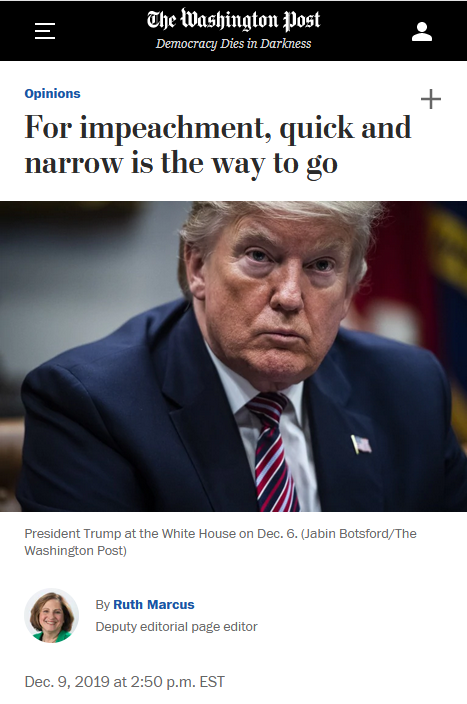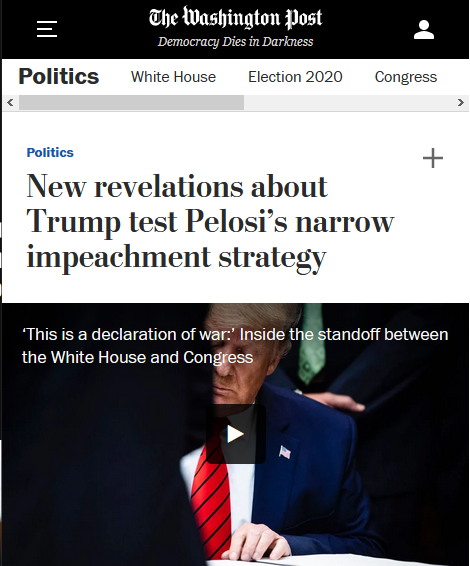WaPo Backing Limited Impeachment Was Constitutional Disaster
Joshua Cho


Mehdi Hasan (Intercept, 9/26/19) was one of numerous journalists and activists who urged Democrats not to pursue a narrow impeachment strategy.
FAIR ( 11/26/19, 2/4/20) has covered how one flagship Resistance TM newspaper, the New York Times, trivialized the importance of the impeachment process as a check on authoritarianism by covering it as a partisan competition, littered with false equivalences, and underplaying the danger Donald Trump and the rest of the Republican Party poses to whatever tatters of democracy the US has left. Instead of raising critical questions about impeachment that would inform their audience of the ways the Democratic Party could function as an effective opposition party, the Times merely regurgitated uncritical “he said, she said” statements, without making the effort to determine whether one side had greater credibility.
Another critical flaw with corporate media’s coverage of impeachment was how it obscured the extent of the Trump administration’s litany of impeachable offenses. The political case for expanding the scope of impeachment, going beyond the Democratic establishment’s narrow attention to abuse of power and obstruction of Congress in the Ukraine case, to all of Trump’s crimes, has been made in several places (e.g., Intercept, 9/26/19; Current Affairs, 2/5/20). Renowned attorney Ralph Nader and constitutional scholars Bruce Fein and Louis Fisher presented no less than 12 impeachable offenses in the Congressional Record ( 12/18/19).
They range all the way from violations of the Constitution’s Declare War and Treaty clauses, when Trump waged war in countries like Libya and Syria, and unilaterally terminated the Intermediate Nuclear Forces Treaty with Russia, to violations of the Appropriations and Appointments clauses, as when he spent billions in excess of what Congress appropriated for the US/Mexican border wall, and appointed “acting” Cabinet officials not confirmed by the Senate. House Democrats impeaching Trump exclusively for his dealings with the Ukrainian president, and for preventing Congress from investigating that isolated incident, was a form of unilateral disarmament that implied Trump was not guilty of anything else, and journalists were under no obligation to stick to that script.
A look at how impeachment was covered by another crusading ResistanceTM publication, the Washington Post, shows how the paper obscured the credible case for impeaching Trump on a variety of other grounds, endorsing the Democrats’ tunnel-vision approach.

Ruth Marcus (Washington Post, 12/9/19) argued that Trump's Ukraine phone call was "significantly worse than his bad conduct elsewhere."
The Post’s “For Impeachment, Quick and Narrow Is the Way to Go” ( 12/9/19), by deputy editorial page editor Ruth Marcus, argued:
Narrow is better because the president’s bad conduct with respect to Ukraine was significantly worse than his bad conduct elsewhere, including his demonstrated efforts to obstruct justice in the special counsel’s probe into Russian meddling….
Sooner is better than later, even though that means lawmakers and the public will be deprived of important, potentially revelatory, testimony that Democrats might be able to compel through court proceedings. The reason is that, even assuming such litigation would succeed, going to court to compel testimony from such recalcitrant witnesses as former national security adviser John Bolton or acting White House chief of staff Mick Mulvaney, and then determining the permissible scope of that testimony, would likely take months.
Post columnist Jennifer Rubin ( 12/9/19) likewise argued that the Democrats’ fixation on abuse of power and obstruction of Congress was powerful precisely because it was the “tightest possible case,” and that testimonies from Donald McGahn and John Bolton were unnecessary to make a “razor-sharp case,” because the “central misdeed is provable from Trump’s own words.”
Another Post op-ed ( 12/4/19), by Watergate Era Judiciary Committee member Elizabeth Holtzman, argued that there are “good reasons” for “including non-Ukraine-related abuses in the charges against Trump,” because focusing “only on Ukraine suggests that Trump’s impeachable offenses are limited to this one matter.” But although it mentioned that Trump’s “abuses are staggering and continuous,” it suggested that other issues—her focus is on Trump’s “impeding the Russia investigation”—could be included in “a broader article of impeachment against Trump for hindering Congress in its constitutional role in conducting an impeachment inquiry.” This would obviate the need for “further investigation”—but also limit the charges against Trump to a circular complaint that he prevented Congress from bringing substantive complaints.
When the Washington Post ( 12/10/19) explained the House’s articles of impeachment, it mentioned that the House’s allegations of abuse of power were specifically confined to Trump’s dealings with Ukraine in order to launch investigations into political opponent Joe Biden. However, the Post left out other ways Democrats could go after Trump’s abuse of power. One example that Nader, Fein and Fisher’s list of Trump's offenses included in the category of abuse of power was Trump’s making “ presidential lies as routine as the rising and setting of the sun” and “confounding civil discourse truth and public trust.” This has precedent, as the House cited Richard Nixon’s “false or misleading public statements for the purpose of deceiving the people of the United States” as part of its articles of impeachment in 1974.
In another report, the Post ( 9/25/19) parroted the “private discussions” Democratic officials were having regarding the scope of impeachment, where they asserted that the “evidence was incriminating enough,” and “easy enough for voters to understand,” that “narrowing the investigation, if only in terms of political messaging, made sense.” Why does the Post take Democratic officials at their word when they claim to be pursuing this approach to impeachment for the sake of easing understanding, or leave their strategy unchallenged? The Post doesn’t need to rely on Democratic officials to inform their audience of the possible impeachment strategies Democrats could pursue.

The Washington Post (10/10/19) claimed that "many rank-and-file Democrats ... fear that trying to investigate too much will undermine what they consider a strong case against Trump."
Later, the Post ( 10/10/19) reported that “recent revelations” were “testing the limits of House Speaker Pelosi’s narrow impeachment strategy, leading some Democrats to wonder whether the probe should be expanded beyond the Ukraine scandal.” It claimed that by “solely focusing on Ukraine, Democrats could miss the opportunity to build a stronger case against the president,” but restricted the potential broadening of the case to Trump trying to enlist then-Secretary of State Rex Tillerson’s aid in stopping the prosecution of a Turkish-Iranian gold trader, and to Trump’s public request to the Chinese government to investigate the activities of Hunter Biden. Apparently, the Post doesn’t consider things like Trump initiating the withdrawal of the US from the Paris climate agreement—and sabotaging international efforts to avoid further climate catastrophe—as a “high crime” and an impeachable offense, as legal scholar Marjorie Cohn does ( Truthout, 6/6/17).
When the Post ( 12/2/19) reported on Democratic officials potentially drafting additional articles of impeachment related to obstructing Mueller’s Russia investigation and using the presidency to enrich himself, it euphemized Trump’s unconstitutional refusal to divest himself from his businesses as an “ unorthodox decision,” and uncritically parroted other Democrats absurdly claiming that “the evidence is not there to support such an indictment.”
Journalist Christian Parenti ( Jacobin, 1/9/20), by contrast, reported that the Democrats were uncomfortable with going after Trump on his blatant violations of the emoluments clause—forbidding him from receiving gifts from foreign powers and limiting presidential remuneration solely to the presidential salary—because it would inevitably open a discussion on the legal bribes the Democrats take from the same corporations that patronize Trump’s hotels.
This suggests that the Democrats pursued such a disastrous approach to impeachment—not out of incompetence or in good faith—but as a cynical spectacle of faux resistance. When the late historian Howard Zinn discussed how the Democrats and the media handled President Richard Nixon’s impeachment, he observed that they didn’t want to emphasize elements of his behavior “found in other presidents” that “might be repeated in the future,” leaving things like “corporate influence on the White House,” and the “power of the president to do anything he wanted in the name of ‘national security,’" intact:
Valuable information came out of the investigations, but it was just enough, and in just the right way—moderate press coverage, little television coverage, thick books of reports with limited readership—to give the impression of an honest society correcting itself.
That might be why the Post’s later report ( 2/5/20) on the Democrats’ failure to remove Trump from office contained no insights on whether impeachment would have had more political success if the Democrats pursued a broader investigation into Trump’s crimes. Of course the Senate was never going to convict; the point was to hold the president accountable—and win over public opinion in the process—by operating as an effective opposition party possessing moral integrity.

Aaron Mate
Journalist Aaron Maté ( Le Monde Diplomatique, 11/19) discussed how the Russiagate conspiracy theory and the Ukraine scandal were both focused on protecting the unsavory conduct of establishment Democratic figures, and portraying Trump as an incompetent steward of the US empire. Maté concluded that the Democrats pursued such a shallow impeachment process because
in Washington, elites generally face consequences for the harm they cause not to the general population but to other members of the club. The standard was laid bare in Watergate (1972–74), when Richard Nixon faced impeachment, not for mass murder in Vietnam, Cambodia and Laos, but for targeting the opposing elite faction and trying to cover it up. George W. Bush could have been impeached for the Iraq invasion in 2003 had this crime not been carried out with bipartisan support.
Ever since the election of Donald Trump, the Washington Post has always presented itself as one of the crusading publications leading the ResistanceTM movement against the current administration. It even adopted the “Democracy Dies in Darkness” motto on its masthead as a marketing gimmick to attract more subscribers. Yet it’s clear that the Post’s impeachment coverage served more to preserve the stability and legitimacy of US institutions—rather than their integrity—by obscuring the extent of the Trump administration’s crimes and impeachable offenses, and endorsing a fatally narrow scope of impeachment.
ACTION ALERT: Messages can be sent to the Washington Post at letters@washpost.com, or via Twitter @washingtonpost. Please remember that respectful communication is the most effective. Feel free to leave a copy of your message in the comments thread of this post.
|







No comments:
Post a Comment
Note: Only a member of this blog may post a comment.